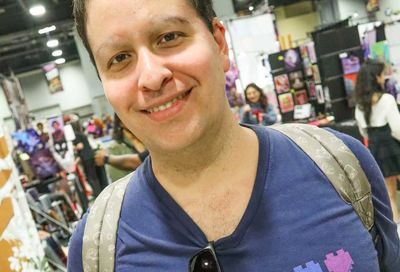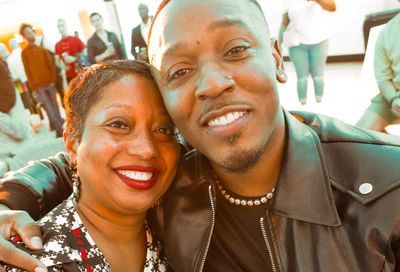An Unflinching Line
Alison Bechdel steps into the frame with an innovative autobiographical search for familial understanding
During an interview on the public radio program Studio 360, Daniel Clowes, known (at least to some) as the creator of Ghost World and Ice Haven, was asked why he avoided referring to himself as an artist or his work as graphic novels. He cited a fear of disappointing readers, people who would run out to purchase a ”graphic novel” expecting something new and daring only to arrive home to discover that what they had bought was simply a hardbound comic book. Or, as Clowes put it, ”It’s just a comic book, I’m a cartoonist — don’t get your hopes up.”
But many graphic novels, particularly some recent releases, have rightly given readers reason to get their hopes up. In fact, there are those who believe that graphic novels are some of the more interesting literature being created today. The clean lines and quiet drawings of Guy Delisle’s travel diary Pyongyang: A Journey in North Korea transported readers to the secretive hermit nation few outsiders will ever experience. David B.’s sad and lonely Epileptic is flooded with thickly rendered ink drawings as bleak and unforgiving as the book’s subject — his brother’s struggle with epilepsy.
There is no better way to describe these works than graphic novels. They are created in such a way that it is impossible to consider that either story or image could successfully exist without the other.
Advertisement
|
Such is the case with Alison Bechdel’s Fun Home: A Family Tragicomic, a graphic novel where the ”Dykes To Watch Out For” artist has stepped from behind the drawing board. In a voice and hand that is strong and unflinching, Bechdel’s memoir recounts the complicated life and tragic death of her father. Struck and killed by a car in what the author believes may have been a suicide, Bechdel’s father was a closeted gay man whose internal struggle manifested itself in obsessive habits and an explosive temper.
But this is not a Daddy Dearest story. On the contrary, what makes this work so engaging is that Bechdel has created a memoir that is focused on exploration, not accusation. And Bechdel’s decision to recount the episodes of her life in words and drawings is both wise and, ultimately, what separates Fun Home from the crowd of nonfiction family stories.
Not content with simply telling us about her life, Bechdel has decided to show it to us as well, warts and all. Where other memoirs are diaries, Fun Home is a family album where no photograph has been removed. There is a drawing of her parents meeting, and of them falling in love. There is a picture of the teenage boy her father hired to help with the landscaping. Another picture is of the same boy, sprawled on a motel bed in his underwear. There is Bechdel coming out. There is Bechdel wondering if her father would still be alive if he had.
Throughout Fun Home, Bechdel demonstrates that she is both a skillful artist and a sophisticated storyteller. Her visual narrative unfolds intuitively. An image from her teen years precedes a baby picture, while a drawing of a particularly awkward stage of adolescence appears to have been accidentally duplicated over and over again. Her narration, on the other hand, moves steadily and constantly forward from the present — all of the floating images and childhood memories are observed from where the adult Bechdel stands today. With Fun Home the author is not just remembering her family and the collective history they share; she is attempting to understand it.
The reality is that it doesn’t matter whether you consider Alison Bechdel’s Fun Home a graphic novel or a comic book hiding between two hard covers. What does matter is that the book is recognized for the brave, innovative and enormously well-done piece of work it is.
Support Metro Weekly’s Journalism
These are challenging times for news organizations. And yet it’s crucial we stay active and provide vital resources and information to both our local readers and the world. So won’t you please take a moment and consider supporting Metro Weekly with a membership? For as little as $5 a month, you can help ensure Metro Weekly magazine and MetroWeekly.com remain free, viable resources as we provide the best, most diverse, culturally-resonant LGBTQ coverage in both the D.C. region and around the world. Memberships come with exclusive perks and discounts, your own personal digital delivery of each week’s magazine (and an archive), access to our Member's Lounge when it launches this fall, and exclusive members-only items like Metro Weekly Membership Mugs and Tote Bags! Check out all our membership levels here and please join us today!























